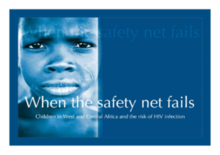The HIV epidemic and the international concern about orphans have contributed to exposing the plight of children in West and Central Africa who are living on the streets, who are trafficked and/ or exploited for child labour, or who are forced into combat in armed conflicts. The impact of these difficult life circumstances on the psychosocial well-being of children and the quality of existing services, however, have barely been investigated.
The overall aims of the study were to improve the offer of psychosocial support services for children in West and Central Africa and to stimulate the creation of a network of services providers. The specific objectives were to assess the mental health and psychosocial needs of children in different study sites; analyze the existing institutions which provide psychosocial support to children in the region; identify best practices and lessons learnt in the field and make recommendations for strengthening psychosocial support programming in the region.
The study investigated the psychosocial impact of different high risk situations in West and Central Africa such as trafficking, ethnic cleansing, armed conflict or parental loss. Researchers short listed areas that were known to be particularly affected by one particular context and opted for the following sites:
• child trafficking for labour in Togo,
• children expelled for ethnic reasons from Cote d’Ivoire in Burkina Faso,
• loss of parents in an area with a high HIV rate in Cameroon,
• growing up without parental support in post-conflict Sierra Leone and
• former association with the fighting forces in Liberia.
In addition to these specific experiences, it assessed domestic and sexual violence in each of the study countries. The study used a matched case-control study design to investigate differences in psychosocial needs of children exposed to the high risk context (for example trafficked children in Togo or former child soldiers in Liberia) compared to a control sample of the same size - children who had never been exposed.
West and Central Africa is home to ever-growing numbers of children who are vulnerable to HIV as a result of trauma and abuse. Psychosocial support for these children is a key investment in HIV prevention, especially in countries where the prevalence of HIV is low. The technical and financial capacity to respond to the psychosocial needs of the thousands of severely affected children in the region is very limited. Resources are targeted too narrowly to specific categories of children, primarily linked directly to their experience with HIV. This, however, misses all those who are particularly vulnerable to HIV infection because their family and community safety nets are no longer intact. The children’s vulnerability to HIV stems from two causes: sexual abuse exposing them directly to HIV infection, and physical and psychological trauma affecting their emotional and mental health, reducing their resilience, and resulting in behaviours that are likely to expose them to HIV.
These children are in need of protection and holistic psychosocial support to help them manage their emotions, find safer solutions to their difficulties, and take control of their lives. Our study in five countries of the West and Central Africa is a snapshot of some groups of young people in need of psychosocial support. Across West and Central Africa there are many more vulnerable young people who are not being reached by services. They will remain excluded if we continue to direct funding towards pre-defined categories of ‘key groups’.

